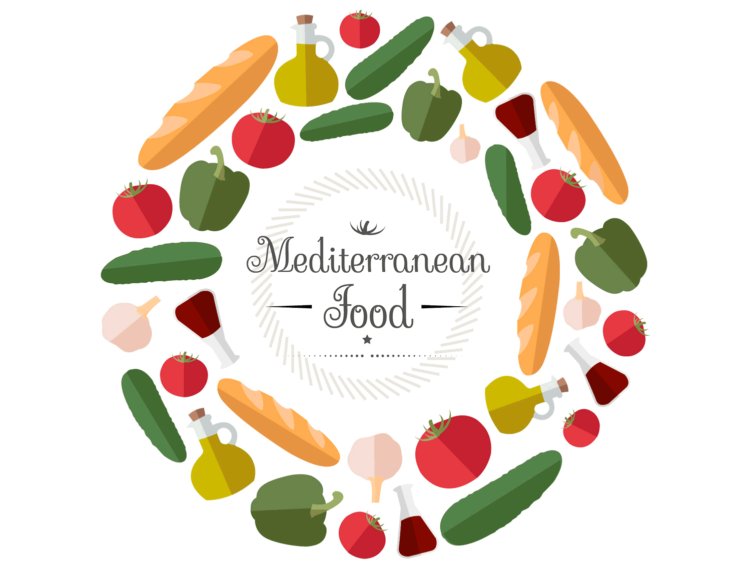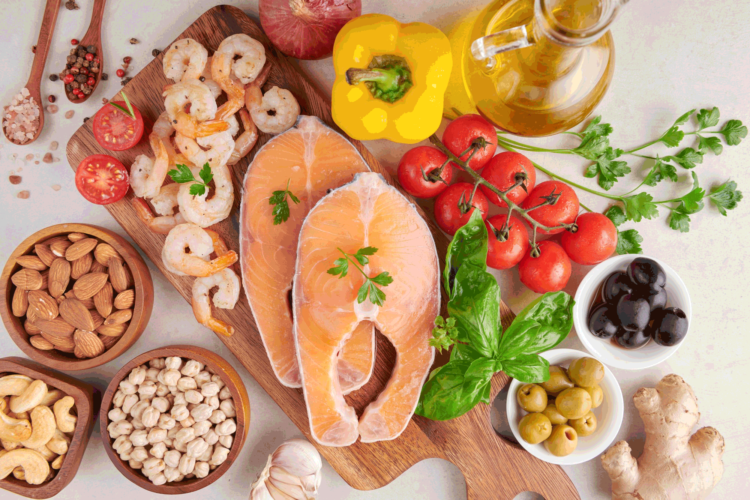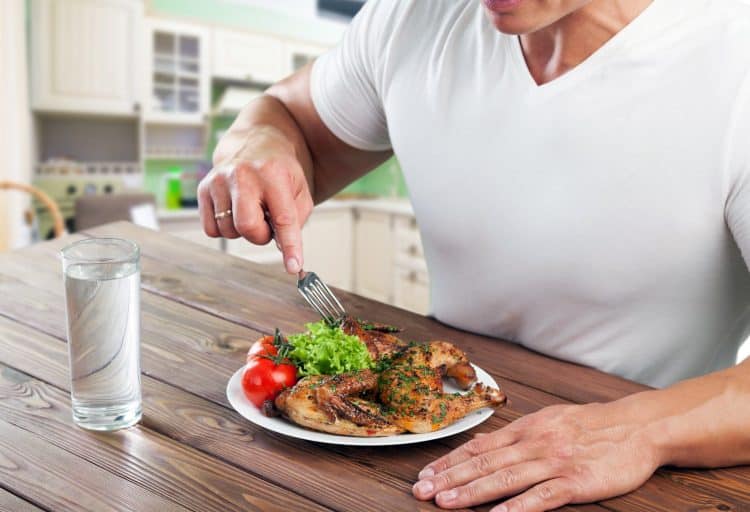As a personal trainer who has been following the usual high-protein diets for almost two decades, I found myself in a rut as my energy levels dipped and recovery lagged. I knew I needed a dietary reset but wasn’t sure about the diet I should pick.
While doom-scrolling on Instagram, I couldn’t ignore all the chatter about the Mediterranean diet.
I did some digging and found that the Mediterranean diet is based on the traditional eating habits of people in countries around the Mediterranean Sea and emphasizes plant-based foods, olive oil, and other healthy fats. This piqued my interest.
A study published in the Journal of Internal Medicine concluded that a Mediterranean diet can reduce the risk of diabetes, neurodegenerative disorders like Alzheimer’s disease, cardiovascular issues, and all-cause mortality. (1)
In this article, I document my journey following the Mediterranean diet for 30 days and how it impacted my heart health markers, satiety, and weight. I’ll also share how you can adopt this diet into your own routine if you decide to give this a go.
Preparation and Planning for the Mediterranean Diet
Most people quit their transformation journey before achieving their goals because they have no plan. You don’t leave your home for a new destination just hoping that you reach the right place. Do you? So why do this with your fitness goals?
Thirty days is a long time, and you can’t wing the Mediterranean diet. I went all-in researching this diet to come up with a bulletproof plan.
These are the main components of the Mediterranean diet:
Plant-based foods:
Processed foods are a no-go in this diet, so I prioritized nutrient-dense whole foods.
- Fruits and vegetables
- Whole grains
- Legumes and beans
- Nuts and seeds
Healthy fats:
Contrary to what most people think, dietary fats are not your enemy, even during a weight loss program. On the other hand, they are necessary for optimal functionality.
- Extra virgin olive oil is the primary fat source
- Avocados and avocado oil
Proteins:
If you want to build muscle, you cannot overlook the importance of protein in your diet. Experts recommend getting anywhere between 1.5-2.2 grams of protein per kilogram of body weight to build and maintain muscle tissue.
The main protein sources in your diet should comprise:
- Fish and seafood — consumed a few times per week
- Poultry and eggs — moderate daily consumption
- Dairy products, mainly cheese and yogurt
- Red meat — consume it infrequently and in small amounts
Beverages:
- Water as the main drink
- Red wine in low to moderate amounts, usually with meals — this is, of course, optional
Sample Daily Mediterranean Meal Plan
This is where the rubber meets the road. Here is what my daily Mediterranean diet looked like:
Breakfast:
- Greek yogurt topped with mixed berries, honey, and a handful of nuts.
- Option 2: A whole-grain toast with avocado and a poached egg.
Lunch:
- A large salad with mixed greens, cucumbers, tomatoes, olives, feta cheese, and grilled chicken or salmon.
- Or lentil soup with a side of whole-grain bread.
Dinner:
- Baked cod with roasted vegetables (broccoli, bell peppers, and onions) and a side of quinoa.
- You could also opt for chicken breast seasoned with herbs, with a large side of mixed greens and an olive oil-based dressing.
Snacks:
You have no shortage of options when it comes to snacks on a Mediterranean diet. I became especially fond of these healthy snacks and had them at any chance throughout the day.
- Your favorite nuts
- Fresh fruit — apple, orange, grapes
- Baby carrots with hummus
- Greek yogurt
Week 1: Initial Adjustments
I won’t lie; going from my normal 4-5 meals a day diet to this new diet wasn’t easy. The initial phase demanded several changes.
Since I was adopting a daily 1,000-calorie deficit, I experienced serious cravings in the first couple of days. This also resulted in a dip in my energy levels, but I was expecting this.
I drank a glass of water every half hour to keep my hunger pangs at bay and fine-tune my metabolism. Remember, the human body is 75% water, and you must stay hydrated throughout the day to ensure optimal body and brain functionality.
Furthermore, I used extra virgin olive oil generously while prepping my meals. I even poured it on my meals as dressing to get all the omega-3 goodness, lower inflammation and risk of cardiovascular risk, and boost my bone and brain health. (2)
Remember, too much of anything is bad, and I was very mindful about the portion sizes. I used this convenient TDEE calculator to determine my ideal daily calorie and macronutrient intake and stayed within the optimal ranges.
Nonetheless, the results after switching to this diet were pretty quick. I noticed an improvement in my overall energy levels, and the mid-afternoon slumps were almost gone by the end of the first week.
Week 2: Finding My Rhythm
Once I was over the hump and my body started adapting to this new challenge, it was time to get stricter with my diet and cut down on the snacks.
I prepped all my meals on my day off from work (on Sunday), helping make sticking to this diet much more convenient. This also significantly lowered the risk of making poor food choices when I felt hungry or rushed and didn’t have healthy food at hand.
My Favorite Mediterranean Recipe
Eating the same things day in and day out can not only lead to boredom and a loss of motivation, but it can also increase the risk of running into nutrient deficiencies. I rotated my meal ingredients and snacks to get a wide range of nutrients.
I tried several recipes throughout these four weeks, but the Greek salad with grilled chicken was the most delicious and became my go-to. Here is how to prep it:
- Combine diced cucumbers, tomatoes, red onions, and Kalamata olives in a bowl.
- Pour olive oil, lemon juice, and oregano on top.
- Top with grilled chicken breast and mix thoroughly.
- Add feta cheese.
This meal is perfect as it delivers a balance of protein, carbs, and healthy fats. Plus, the salad delivers a solid dose of fiber and micronutrients, promoting gut health and helping get rid of free radicals.
The thing that stood out the most to me was that I felt full after each meal and didn’t necessarily feel hungry before it was time for the next big meal.
The One Big Challenge
The world doesn’t stop just because you are following a new diet. Even though I told every close friend about this new diet experiment, I was invited to several dinners during these four weeks, and there were some invitations I couldn’t decline.
The good thing here is that unlike some overly restrictive diets, it isn’t too difficult to eat healthy in restaurants while following the Mediterranean diet. I usually opted for grilled fish, salads, or whole-grain options and asked for olive oil instead of creamy dressings. Every restaurant accommodated my cooking instructions.
Week 3: Noticing Physical and Mental Changes
When I started this challenge, I aimed for a modest but sustainable weight loss. An improvement in my overall body composition was my first priority.
By Week Three, I noticed a more consistent downward trend in weight. I was down almost 6 pounds by the end of this phase, which is quite good, if you ask me.
The initial few pounds were likely water weight since I didn’t see any significant changes in my physique aesthetics, but that changed as my body began tapping into stored fat reserves. More importantly, I felt much less bloated throughout the day, and my clothes fit a lot better.
Skin and Digestive Health Improvement
The Mediterranean diet delivers a solid punch of healthy fats from olive oil and fish, which I assume improved my skin quality and overall complexion. I am too shy to admit this, but my skin has gained a healthy glow. (I’m blushing right now.)
Without getting too hung up on how good I look now, let’s talk about the improvement in my digestion. This diet is rich in fiber and improves gut microbiome, resulting in better digestive health and bowel movements and a reduction in digestive discomfort.
These changes help lower the occurrence of flatulence and can be a lifesaver for people on a high-protein bodybuilding diet. I also noticed less bloating and more consistent energy levels throughout the day.
This might sound a little vague, but I felt lighter and more energetic throughout the way while following this diet.
Mental Clarity
Cutting out refined sugars and processed foods from my diet stabilized my blood sugar levels, contributing to improved mental clarity. Brain fog and confusion, especially mid-afternoon, were almost gone.
Stress reduction is one of the most underrated benefits of following a healthy diet like the Mediterranean diet.
Coach Tip: I highly recommend keeping a workout and diet log and monitoring your progress (subjective and objective) to ensure you are moving in the right direction.
Week 4: The Culmination of 30 Days
I had thought adjusting to this new diet would be difficult, but I actually enjoyed it very much as the rich flavors of the Mediterranean cuisine offered a welcome change to my otherwise bland high-protein bodybuilding diet.
Improvements in Health Markers
Many doctors recommend the Mediterranean diet to their patients as the healthy foods can lead to overall health improvement.
To be honest, I’ve never tracked the changes in my health markers when switching to a new diet, and doing it for this experiment caused a little anxiety. Nonethless, everything pointed in the right direction as my blood pressure dipped from 128/82 to 122/78 — subtle, but solid progress for four weeks in my case.
My HDL cholesterol (the good stuff) nudged up, while the LDL (nasty kind) took a hit downward.
These numbers are not extraordinary, but the changes signal toward a stronger heart.
It doesn’t end here. I noticed an improvement in my recovery after switching to this diet, and now didn’t need as long to recuperate between sets and workouts.
The Numbers
Let’s now get a little specific and talk numbers, because who doesn’t like that? This is how the Mediterranean diet panned out for me:
| Metric | Day 1 | Day 30 | Change |
| Weight | 185 pounds | 177 pounds | -8 pounds |
| Body Fat % | 16% | 13.5% | -2.5% |
| Waist (inches) | 34 | 32.5 | -1.5 inches |
| Bicep (inches) | 15.5 | 15.5 | No change |
I don’t know about you, but I’d say these results are good enough that everyone should give this a try at least once.
This also brings us to a crucial question: Can you stick to this diet for the long term? The answer, I would say, is a resounding yes! The Mediterranean diet is not restrictive and offers a lot of variety and choices, ensuring you can achieve your nutrition objectives without feeling bored.
Use the meal plan detailed in this article as a blueprint. Feel free to tweak it according to your unique lifestyle and goals. As a personal trainer who spends most of his days in the gym, I can attest that nothing drains your motivation than following a diet or training program that adds friction to your life.
Conclusion
Initially, I had no idea what to expect from this one-month challenge, but the results blew me away. The Mediterranean diet helped me lose weight and improve my energy levels, mental and physical performance, and health markers like blood pressure and cholesterol levels. I literally couldn’t have asked for more.
Remember, you don’t have to switch to the Mediterranean diet overnight. Start slow and swap one of your daily meals with a Mediterranean meal. Increase the frequency as your body starts adapting to the new routine.
If you have any questions about the Mediterranean diet or need help implementing this into your own routine, post them in the comments below, and I’ll be happy to help!
References:
- Guasch-Ferré M, Willett WC. The Mediterranean diet and health: a comprehensive overview. J Intern Med. 2021 Sep;290(3):549-566. doi: 10.1111/joim.13333. Epub 2021 Aug 23. PMID: 34423871.
- Serreli G, Boronat A, De la Torre R, Rodriguez-Moratò J, Deiana M. Cardiovascular and Metabolic Benefits of Extra Virgin Olive Oil Phenolic Compounds: Mechanistic Insights from In Vivo Studies. Cells. 2024 Sep 16;13(18):1555. doi: 10.3390/cells13181555. PMID: 39329739; PMCID: PMC11430205.
Tip: If you're signed in to Google, tap Follow.













